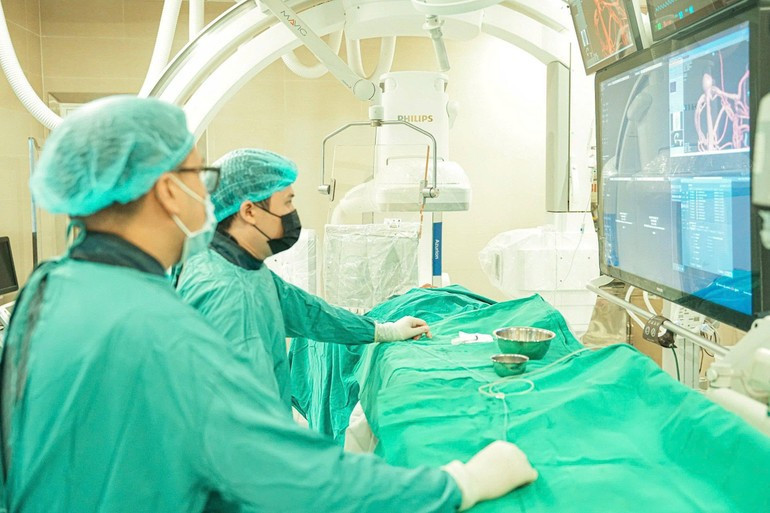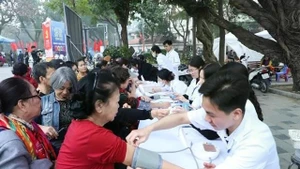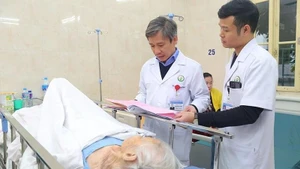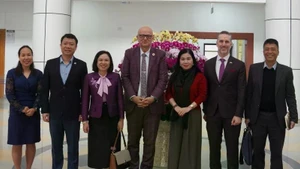The Ministry of Health affirms that AI cannot replace humans and serves only as a support tool, so it is focusing on refining the legal framework and building an appropriate application strategy.
AI has become a key driving force for building a modern, equitable, safe and sustainable healthcare system. AI is supporting activities such as: diagnostic imaging, personalised treatment pathway development, early warning, remote monitoring and clinical decision support.
Additionally, AI is also used in hospital management, operational data analysis, epidemiological forecasting, and resource optimisation. The Viet Nam healthcare sector adopted AI relatively early and has achieved encouraging results, helping to improve the quality of clinical consultation and treatment, reduce administrative procedures, and optimise hospital operations.
At Bach Mai Hospital, AI is being deployed in various fields: diagnostic imaging, clinical decision support for doctors, hospital management (patient demand forecasting, resource allocation, supply chain management), and workflow optimisation.
Notably, this hospital is collaborating with the University of Technology (Viet Nam National University, Ha Noi) to develop AI software capable of simultaneously analysing three types of medical imagery: chest CT, bronchoscopic endoscopy and histopathological slides. This is the first time in Viet Nam that a unified AI system has been applied across all three lung cancer diagnostic fields, opening up substantial potential for early disease detection and treatment. The software functions as an “intelligent assistant”, helping to shorten diagnostic times, enhance the detection of micro lesions, and reduce pressure on doctors.
Associate Professor Vu Van Giap, Deputy Director of Bach Mai Hospital, said that the hospital is implementing its digital transformation plan based on six strategic pillars, in which big data analytics and AI application are the top priority pillar.
Associate Professor Nguyen Cong Long, Chairman of the Viet Nam Society of Interventional Gastroenterological Endoscopy, said: AI and modern endoscopy techniques are creating a breakthrough for early detection of gastrointestinal cancers – a disease group with the highest morbidity and mortality rates in Viet Nam. These solutions help doctors accurately diagnose very small lesions, increase patients’ chances of recovery, especially since the detection of pre-cancerous lesions has always been a major challenge when initial signs are very small, easily missed by the naked eye, or confused with common gastrointestinal conditions when observed visually.
Recently, the Politburo issued Resolution No. 57-NQ/TW dated December 22, 2024, on breakthrough scientific and technological development, innovation, and national digital transformation, and Resolution No. 72-NQ/TW dated September 9, 2025, on a number of breakthrough solutions to strengthen the protection, care, and improvement of public health.
Alongside this, the Prime Minister approved the National Digital Transformation Programme with the goal of making Viet Nam a digitally developed nation that is stable and prosperous. On this basis, the Ministry of Health identifies AI application as one of the key supporting solutions to modernise the healthcare system, improve the quality of healthcare services, and ensure patient safety in the new era.

According to experts in the information technology sector, Viet Nam has advantages for AI adoption in healthcare, with three key strengths: the workforce that implements applied products, the readiness of healthcare data, and strong practical demand. However, for many reasons, these strengths have not yet been fully utilised. A 2024 survey conducted by the National Health Information Centre (Ministry of Health) showed that 13% of facilities lack data, 66% lack funding, 28% lack information technology personnel.
According to Professor Nguyen Thanh Thuy, Head of the Viet Nam Informatics Association, AI in healthcare is not merely an “add-on” application, but will bring about revolutionary changes to operational structures; not only in job processing, but also in building the national digital health infrastructure. However, the current biggest challenge is the readiness, standardisation and interoperability of healthcare data. Data is seen as a resource but remains fragmented, unstandardised and inconsistent. This is the most urgent bottleneck that must be resolved for national healthcare AI development in Viet Nam.
To ensure AI application in healthcare is directed correctly, Vice Minister of Health Nguyen Tri Thuc believes that the legal framework must move one step ahead, and therefore it is necessary to complete the system of legal documents regulating AI application in healthcare; and, at the same time, to develop research strategies, directions for development, and orientations for AI application, so as to clearly identify priority areas in order to create valuable healthcare AI systems.
AI application in healthcare requires the processing of large volumes of personal data, so the Ministry of Health will coordinate with relevant agencies to ensure that AI systems strictly comply with information security regulations, preventing risks of personal data breaches. Final treatment decisions must always be supervised and validated by doctors, ensuring professional responsibility and safeguarding patients’ rights and interests.
According to Professor Nguyen Thanh Thuy, Viet Nam needs to focus on three strategic pillars. First, it is necessary to standardise the national healthcare data system, shifting from medical record storage to building a national healthcare data infrastructure aligned with international standards. Secondly, it is necessary to provide interdisciplinary and cross-disciplinary training for human resources. Thirdly, a legal and ethical AI framework must be established, where transparency and accountability are the highest requirements for AI applications in healthcare.
Recently, the National Health Information Centre (Ministry of Health) signed a cooperation agreement with HealthAI to take part in the Global Regulatory Network (GRN) and the AI Community of Practice (COP) for healthcare. The GRN and CoP networks are coordinated by HealthAI, gathering leading regulators and global experts from many countries to build an ethical, transparent, reliable AI for healthcare foundation. Official participation in GRN and COP marks an important step in strengthening digital health capacity and promoting responsible AI adoption in healthcare in Viet Nam.
















